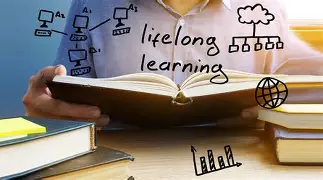Analysis of Lifelong Education Practice Experiences through Grounded Theory
Main Article Content
Abstract
This study aims to provide insights into the direction of lifelong education practice by analyzing the experiences of lifelong education practice through grounded theory to enhance the professionalism of lifelong educators. To achieve the research objective, interviews with seven participants in lifelong education practice were analyzed using grounded theory, and the results are as follows. First, the central phenomenon regarding the experience of lifelong education practice was the reestablishment of the concept of lifelong education. Second, the process analysis using grounded theory revealed that the prospective lifelong educators went through stages of exploration, acceptance, adjustment, and establishment during their practice. Third, the core category that integrates and connects the categories in this study, which is also the central phenomenon, is the reestablishment of the concept of lifelong education. The outcomes include heightened expectations for lifelong education and the achievement of self-realization through lifelong education.
Downloads
Article Details
Issue
Section

This work is licensed under a Creative Commons Attribution-NonCommercial-NoDerivatives 4.0 International License.
References
Ministry of Education. (2023). Teacher qualification verification manual. Sejong: Ministry of Education.
Ministry of Education. (2019). 2019 Lifelong education specialist certification program for stakeholders training. Seoul: National Lifelong Education Promotion Agency.
Ministry of Education. (2015). Guidelines for lifelong education practicum courses. Sejong: Ministry of Education, Lifelong Learning Policy Division.
Kuk, H. S. (2018). The practice patterns of lifelong educators and the transformation of experiential learning: A focus on the field experiences of lifelong educators working in local governments. Journal of Lifelong Education Research, 24(2), 87-115.
Kim, J. E., & Jeong, K. O. (2009). Changes in teacher efficacy of pre-service special education teachers through teaching practicum. Journal of Developmental Disabilities, 52(4), 367-384.
Kim, J. Y. (2021). Research on the professional development process of career guidance teachers: A grounded theory approach. Journal of Career Education Research, 34(4), 1-35.
Kim, H. B. (2016). Professional socialization of lifelong educators: Focusing on the experiences of lifelong educators working in local governments. Journal of Lifelong Education Research, 22(3), 27-53.
Kim, H. B., & Park, S. Y. (2007). Exploration of learning experiences of university students in the lifelong education specialist training program. Journal of Lifelong Education Research, 13(2), 75-92.
Na, K. E. (2012). A grounded theory study on the educational practicum experiences of pre-service special education teachers. Special Education Journal: Theory and Practice, 13(3), 269-289.
Park, M. S. (2020). Analysis of the relative importance of lifelong education practicum content. Journal of Lifelong Education & HRD, 16(1), 161-185.
Park, J. H., & Choi, H. J. (2008). Exploration of university students' lifelong education practicum experiences for obtaining lifelong education specialist certification. Journal of Lifelong Education Research, 14(4), 215-243.
Byeon, J. I. (2003). Analysis of the roles of lifelong educators and measures to enhance their status. Journal of Lifelong Education Research, 9(2), 195-193.
Bae, E. K., Lee, M. Y., & Kang, S. H. (2020). Analysis of research trends related to lifelong education specialists in Korea: An integrative analysis of qualitative and quantitative studies. HRD Research, 22(3), 1-31.
Bae, H. R. (2022). Analysis of research trends on the competencies of lifelong education specialists: Focusing on domestic papers over the past 20 years up to 2021. Journal of Lifelong Education Research, 28(4), 137-159.
Lee, K. Y. (2021). Analysis of research trends related to lifelong education specialists in Korea. Journal of Learner-Centered Curriculum and Instruction, 21(4), 1105-1128.
Yu, K. W. (2022). Systematic approach to grounded theory methodology: A guide for writing papers. Seoul: PY Mate Co., Ltd.
Lee, D. S., & Kim, Y. C. (2012). Philosophical background and methodological characteristics of grounded theory as a qualitative research method. Open Education Research, 20(2), 1-26.
Lee, J. S., & Jo, A. M. (2012). School adjustment processes of victims of school violence approached through grounded theory. Journal of Youth Welfare, 14(1), 333-358.
Conderman, G., Morin, J., & Stephens, J. T. (2005). Special education student teaching practices. Preventing School Failure, 49(3), 5-10.
Corbin, J. M., & Strauss, A. L. (2008). Basics of qualitative research: Techniques and procedures for developing grounded theory (3rd ed.). Los Angeles: Sage.
Glaser, B. G., & Strauss, A. L. (1967). The discovery of grounded theory: Strategies for qualitative research. Lee, B. S., Park, S. W., & Kim, S. H. (Eds. & Trans.). (2011). The discovery of grounded theory: Qualitative research strategies. Seoul: Hakjisa.
Lincoln, Y. S., & Guba, E. G. (1985). Naturalistic inquiry. Newbury Park, CA: Sage Publications.
Morse, J. M. (2001). Situating grounded theory within qualitative inquiry. In Schreiber, R. S., & Stern, P. N. (Eds.), Using grounded theory in nursing (pp. 1-12).
Shin, K. R., & Kim, M. Y. (Eds. & Trans.). (2003). Grounded theory research methodology. Seoul: Hyunmoon Sa.

